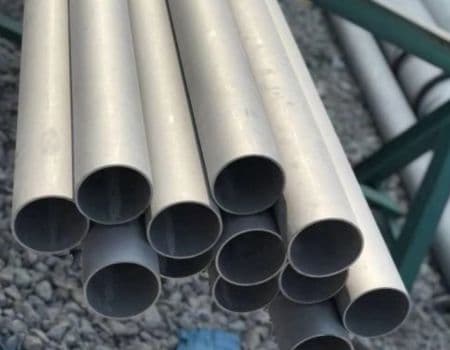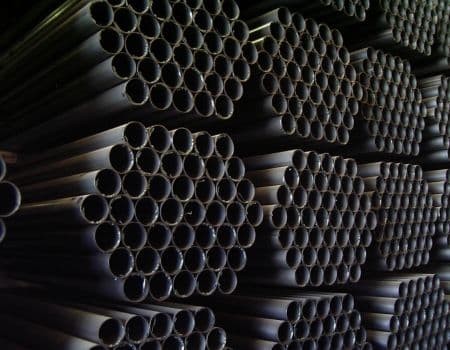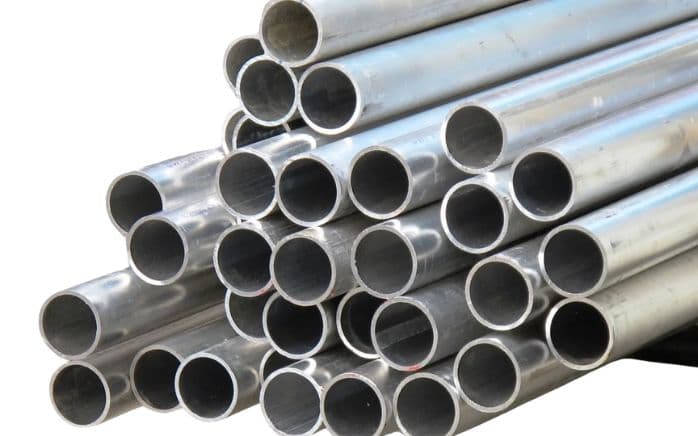| Specifications | Astm, Asme, Din, Nfa, Jis |
|---|---|
| Thickness | 4.0mm, 100mm |
| Pipes Size | 1/8” Nb, 24” Nb, 1/4” Od, 24” Od Sizes |
| Tubes Size | 1/2″ Od, 8″ Od |
| Length: | Cut Length, Single Random, Double Random, Fix Length, Required Length |
| End | Beveled End, Plain End, Threaded |
Stainless steel seamless pipes manufactured in India for oil gas chemical processing power plants and industrial piping systems
Sagar Steel Corporation is a leading Stainless Steel Seamless Pipes manufacturer, which manufactures high-quality pipes with engineering that is geared towards corrosion resistance, strength, and long duration. They are smooth, welds are nonexistent, and this is what makes these seamless pipes consistent and much better in the high-pressure and high-temperature conditions. They are commonly applied in the chemical, oil and gas, pharmaceutical, and food processing industries, in industrial and architectural applications. We also provide Inconel Pipes to suit industrial specifications.
Stainless Steel Seamless Pipes – Material & Grade Table
Common Name ASTM / UNS Grade Typical Composition (Main Elements) Typical Applications Key Properties SS 304 Seamless Pipe ASTM A312 TP304 / UNS S30400 Cr 18–20%, Ni 8–10.5% Food, beverage, chemical piping Excellent corrosion resistance, good formability SS 304L Seamless Pipe ASTM A312 TP304L / UNS S30403 Cr 18–20%, Ni 8–10.5%, Low C Chemical & welded pipelines Improved weldability, reduced carbide precipitation SS 316 Seamless Pipe ASTM A312 TP316 / UNS S31600 Cr 16–18%, Ni 10–14%, Mo 2–3% Marine, chemical, offshore Superior corrosion & pitting resistance SS 316L Seamless Pipe ASTM A312 TP316L / UNS S31603 Cr 16–18%, Ni 10–14%, Mo 2–3%, Low C Pharmaceutical, marine Excellent corrosion resistance, excellent weldability SS 321 Seamless Pipe ASTM A312 TP321 / UNS S32100 Cr–Ni stabilized with Titanium High-temperature piping Good creep resistance, stable at high temperatures SS 310 Seamless Pipe ASTM A312 TP310 / UNS S31000 Cr 24–26%, Ni 19–22% Furnaces, heat exchangers Excellent oxidation resistance at high temperatures Duplex 2205 Seamless Pipe ASTM A790 UNS S32205 Cr 22%, Ni 5%, Mo 3% Oil & gas, pressure systems High strength, excellent stress corrosion resistance Super Duplex 2507 Pipe ASTM A790 UNS S32750 Cr 25%, Ni 7%, Mo 4% Offshore, seawater systems Very high strength, superior corrosion resistance
The Stainless Steel Seamless Pipes have the following key characteristics.
| Common Name | ASTM / UNS Grade | Typical Composition (Main Elements) | Typical Applications | Key Properties |
|---|---|---|---|---|
| SS 304 Seamless Pipe | ASTM A312 TP304 / UNS S30400 | Cr 18–20%, Ni 8–10.5% | Food, beverage, chemical piping | Excellent corrosion resistance, good formability |
| SS 304L Seamless Pipe | ASTM A312 TP304L / UNS S30403 | Cr 18–20%, Ni 8–10.5%, Low C | Chemical & welded pipelines | Improved weldability, reduced carbide precipitation |
| SS 316 Seamless Pipe | ASTM A312 TP316 / UNS S31600 | Cr 16–18%, Ni 10–14%, Mo 2–3% | Marine, chemical, offshore | Superior corrosion & pitting resistance |
| SS 316L Seamless Pipe | ASTM A312 TP316L / UNS S31603 | Cr 16–18%, Ni 10–14%, Mo 2–3%, Low C | Pharmaceutical, marine | Excellent corrosion resistance, excellent weldability |
| SS 321 Seamless Pipe | ASTM A312 TP321 / UNS S32100 | Cr–Ni stabilized with Titanium | High-temperature piping | Good creep resistance, stable at high temperatures |
| SS 310 Seamless Pipe | ASTM A312 TP310 / UNS S31000 | Cr 24–26%, Ni 19–22% | Furnaces, heat exchangers | Excellent oxidation resistance at high temperatures |
| Duplex 2205 Seamless Pipe | ASTM A790 UNS S32205 | Cr 22%, Ni 5%, Mo 3% | Oil & gas, pressure systems | High strength, excellent stress corrosion resistance |
| Super Duplex 2507 Pipe | ASTM A790 UNS S32750 | Cr 25%, Ni 7%, Mo 4% | Offshore, seawater systems | Very high strength, superior corrosion resistance |
Preference is given to steel seamless pipes that are made of stainless steel because they are strong and easy to operate serve well.
- Seamless construction for uniform strength and pressure resistance
- Excellent corrosion and oxidation resistance
- Good performance in high-temperature environments
- Smooth internal surface for efficient fluid flow
- Long service life with minimal maintenance
These features make stainless steel seamless pipes ideal for demanding industrial piping systems.
Stainless Steel Seamless Pipes – Sizes, Types & Availability Table
| Pipe Type | Outside Diameter | Length | Schedule / Thickness | Minimum Quantity |
|---|---|---|---|---|
| Austenitic SS Seamless Pipes | 1/8" NB – 24" NB | SRL / DRL / Cut | SCH 5 – SCH XXS | 200 Pcs |
| Duplex SS Seamless Pipes | 1/2" NB – 24" NB | SRL / DRL / Cut | SCH 10 – SCH XXS | 200 Pcs |
| Super Duplex Seamless Pipes | 1/2" NB – 24" NB | SRL / DRL / Cut | SCH 10 – SCH XXS | 200 Pcs |
| High-Temperature SS Pipes | 1/8" NB – 20" NB | SRL / DRL / Cut | SCH 10 – SCH XXS | 200 Pcs |
| Custom SS Seamless Pipes | As Required | As Required | As Required | 200 Pcs |
We manufacture our seamless pipes according to the specifications of our clients i.e. dimensions, wall thickness, and surface finishes, which are customised to fit the requirements of the exact project. Relied upon to deliver the same quality and performance that is dependable, they are applied to industrial industries where reliability is also a key factor. Global clients have a high demand for these pipes, and thus they are their preferred product in B2B portals when making bulk orders, for critical infrastructure, and undertaking large-scale industrial projects. They are always maintained to high standards of operational requirements through strict quality control and timely delivery, and efficient logistics.
Type of Sub-products

304 Stainless Steel Seamless Pipe 304 Stainless Steel Seamless Pipe
Excellent corrosion resistance and formability for general-purpose use.

316 Stainless Steel Seamless Pipe 316 Stainless Steel Seamless Pipe
Enhanced molybdenum content for better performance in marine and chloride-rich environments.
